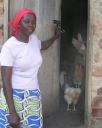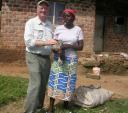

I first met Rose Kasoma at the office of Share an Opportunity (SAO) Microfinance, Ltd in Kampala, Uganda where she came to pay the monthly installment on her $1,200 loan funded by Kiva lenders. We talked briefly and I asked permission to visit her.
On November 30, 2007, accompanied by Stuart Tamale, a young college educated Ugandan loan officer working for SAO, we went to Rose’s store.
The store is well located in the Ugandan version of a strip mall near a “round-about” on a busy thoroughfare on the outskirts of Kampala. All shops in the brick strip mall open to the outside air toward the road. There were approximately ten shops in the mall, all the same size; about 5 paces wide and 5 paces deep. Rose’s store was well stocked, clean, and the merchandise was nicely displayed. I saw no shops in the immediate area offering the same product selection as Rose. Her shelves were better stocked than some nearby shops.
When we arrived at 9 am, Rose’s youngest son Brian was alone in the store. Brian was well dressed and polite. Like his mother, he is soft spoken. Brian is 14 years old and on vacation from Senior 2 grade, which is the equivalent of ninth grade in the US.
 Next, Stuart took me to Rose’s home. It was not easy to find. He navigated down a winding dirt path to a dead end. Rose’s compound, perched on the edge of a swampy jungle inhabited by monkeys, consists of a small brick house, a brick chicken coop, a broken down confinement structure for her 3 cows, and an outhouse.
Next, Stuart took me to Rose’s home. It was not easy to find. He navigated down a winding dirt path to a dead end. Rose’s compound, perched on the edge of a swampy jungle inhabited by monkeys, consists of a small brick house, a brick chicken coop, a broken down confinement structure for her 3 cows, and an outhouse.
Rose greeted us warmly. We talked as she hacked stalks of sugar cane into foot long segments for sale at the store. At one point, she went to the chicken coop, removed a chicken, gently calmed the frightened animal, and then proceeded to offer it to me as a gift. I was overwhelmed by her generosity, considering this bird represented a significant portion of her farm assets. I declined the gift, explaining that I didn’t know how to cook (or butcher) a chicken, and I was staying in a hotel with no kitchen. I thanked her profusely for the offer.
Rose is one of seven children. Her husband, who was away the day we visited, is also one of seven children. Rose’s father refused to pay tuition for her schooling but her mother somehow found money to pay for Rose’s limited education. Her understanding of English is excellent, but she preferred to answer my questions in the local language, which Stuart translated.
Rose has two sons and one daughter. The oldest son, Nicholas, is in medical school training to be a doctor. The daughter, Victoria, is in nursing school. We met the younger son Brian at the store. Rose does not intend to have more children.
Rose first became acquainted with SAO Uganda when its social service component gave her tuition assistance for Nicholas and Victoria in elementary school.
When I asked Rose how business was going, she said it was only “so-so”. Sales are stable, and with the Kiva loan she is able to maintain a good inventory of general merchandise for her customers. Occasionally she is asked to extend credit, but she resists because she has to make her monthly loan repayments. She pays cash for her stock and does not accept trade credit when offered. Rose is a serious, but cautious businesswoman.
The big event in Rose’s life right now is a small plot of land her husband recently inherited in a nearby township. The ground is well drained and more suitable for raising livestock than their current swampy location. She and her husband would like to move there and add pigs to their collection of cows and chickens. To do this they will need money to build a new home and farm buildings. When I asked if she would sell her current home, she quickly replied no, it was being saved for the children.
When I asked Rose what her dream in life is, she paused, and then explained that she is old and wants to retire to the new farm to raise livestock. Rose is much younger than I am, but the average life expectancy in Uganda is less than 50, so she considers herself old. She often works till midnight at the store. Although her children are well educated, Rose understands the vagaries of Uganda’s economy well enough to also train them to be self-sufficient entrepreneurs, in case all else fails. She intends to pass the store on to one or more of the children.
Our interview ended as we delivered Rose to her store. It was time for work, not talk, so I bid her goodbye with confidence that Kiva’s funds are well invested and secure.
/>













